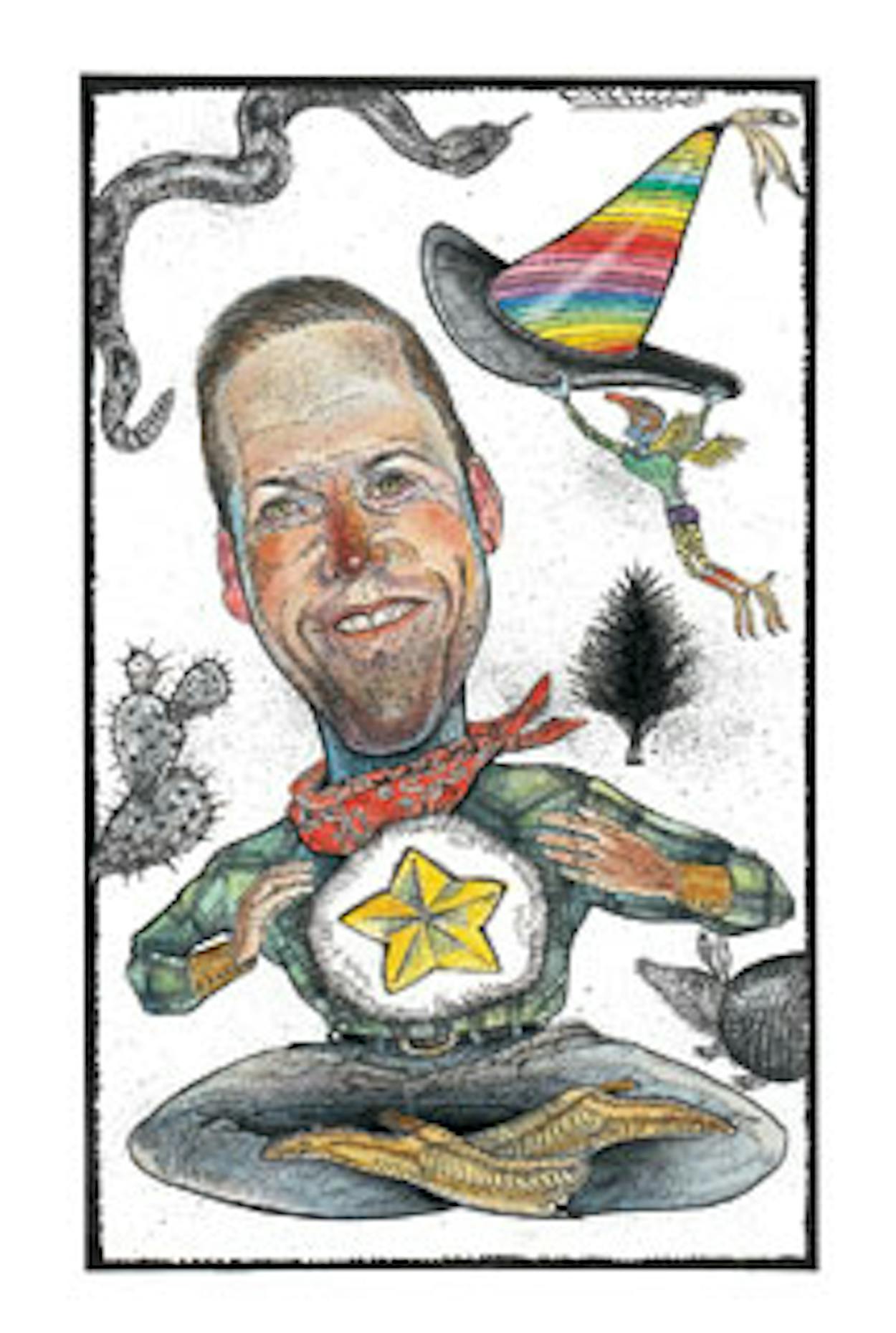Q: I was born and raised in Texas until age eight and then moved to Pittsburgh, after which I went to college in Arizona. Now living and working in New York City, I am confused as to the proper answer when asked, “Where are you from?”
Kate von der Porten, New York City, New York
A: It is your birthright to claim Texas as your place of origin, and you are absolutely right to do so proudly when asked. Unlike Stephen F. Austin, Sam Houston, George W. Bush, and a mess of other so-called Texans, you were actually born here. Furthermore, you resided here until the ripe old age of eight, by which point, if your childhood was anything like the Texanist’s, you had engaged in such authentic local rituals as plinking cans off cedar fence posts, drinking your dad’s Lone Star, and riding your Schwinn in the cloud behind the DDT truck.
The answer to the question “Where are you from” can vary greatly depending on where you are when asked. Like “Mean” Joe Greene, the Texanist was born and raised in Temple. When in Austin, home for more than half his life, he tends to say, “Temple.” But on a plane to Los Angeles, he might say, “Austin.” If he were to find himself abroad, he would likely say, “Texas.” Some people, like the Texanist’s father, feel no such need to make adjustments. When posed this question, he would often respond, “Temple born, Temple bred, and when I die I’ll be Temple dead.”
New York City is full of people, like yourself, who hail from elsewhere. Utah. Arizona. Iowa. Imagine the look of boredom those people receive when they state their birthplaces. The Texanist would venture a guess that few are the Manhattan dinner parties to have been brightened by the description of an Oklahoma upbringing. You, on the other hand, are fortunate, Ms. von der Porten. You are from Texas.
Q: Is it proper to tip at Sonic?
Julia S. Blackshear, Shreveport, Louisianna
A: It chagrins the Texanist to admit that this philosophical debate never once arose on the countless Saturday nights he spent cruising the Sonic on South Fifty-seventh in Temple. Back then, he was as likely to tip at Sonic as meet curfew. Cruising the drive-in was a regular pastime with its own set of rules (always circle the restaurant before parking, so as to survey the full extent of the evening’s fauna). In retrospect, a good Sonic tip in those halcyon days of unrequited parking lot love would have been something like “A lime slush with a clear liquor floater does not an aphrodisiac make.”
It is Sonic’s use of the carhop that is assuredly the crux of your quandary. The restaurant was founded more than fifty years ago, when such things were common. Though its origins lie in Shawnee, Oklahoma, there are now more Sonics in Texas than anywhere else, and last week, the Texanist drove over to the one near his house to research your question. One of the carhops, a young man named Michael Messer, explained that he makes the trip from kitchen to driver’s-side window one hundred to two hundred times a day. “It’s really hard work,” he said. “You sweat. And you have to make drinks.” What about tips? Messer told the Texanist that while only about half of those trips end in a gratuity, some patrons are extremely generous, leaving as much as $3 for a single limeade.
The Texanist is now of the school that it is better to receive and to give—receive good service and give a good tip. The pertinent question is not should one tip at Sonic, but what’s 15 percent of $6.11, the price of a Sonic-sized #1 Combo, add cheese and jalapeños.
Q: Is it ever okay to ask somebody how many acres he has?
Shannon Simpson (Texan in Exile), Picayune, Mississippi
A: Such an inquiry is okay only if you happen to be a potential buyer or lessee, an agent of the local taxing authority, or a direct family relation. In certain cases, it may be permissible if you are a hopeful direct familial relation, but the Texanist would strongly discourage such a query, since it may result in your being run off sternly by the young man’s father. In short, the amount of a person’s acreage is really none of your business. You wouldn’t ask a lady her age or how much she’s got in her bank account, would you? In Texas, where cards are held close to the vest and land close to the heart, none of these matters may be pursued by a direct appeal.
However, a visit to the Web site of the Texas Association of Appraisal Districts ought to satiate your curiosity without running you afoul of the proper codes. There, armed only with a person’s last name, you can find out all manner of things regarding his properties. But the Texanist must warn you to be careful with whatever information you glean. Though technology has led to increased transparency, it has not changed the indignation with which most Texans will respond to such prying.
Q: How might one gently inform people that ribs boiled and then grilled with sauce slathered on them do not constitute barbecue?
Mary Ann, via e-mail
A: a) “Goddamn! What happened to these ribs?” b) “What’s this gummy substance attached to the bones here?” c) “Boiling is for noodles!”
While the Texanist certainly understands your desire to choose from among a, b, or c, the correct way to approach this serious situation is d, which stands for “diplomacy.” For starters, you might ask the person guilty of this abomination how his move was from Rhode Island. Once you have the outlander properly tenderized with niceties, let the education commence. With all the feigned sincerity you can muster, compliment the subtlety of his meat’s flavor. With bated breath, ask this series of one-word questions: Oak? Mesquite? Pecan? Your puzzled chef will likely respond with a blank stare or, worse, by showing you a jug of Liquid Smoke. At this point, you should gently explain that the good Lord, in all his wisdom, gave us meat, hardwoods, fire, and incisors for a reason: that we may eat barbecue.
The Texanist, by the way, prefers oak and mesquite with an oak and pecan finish.









